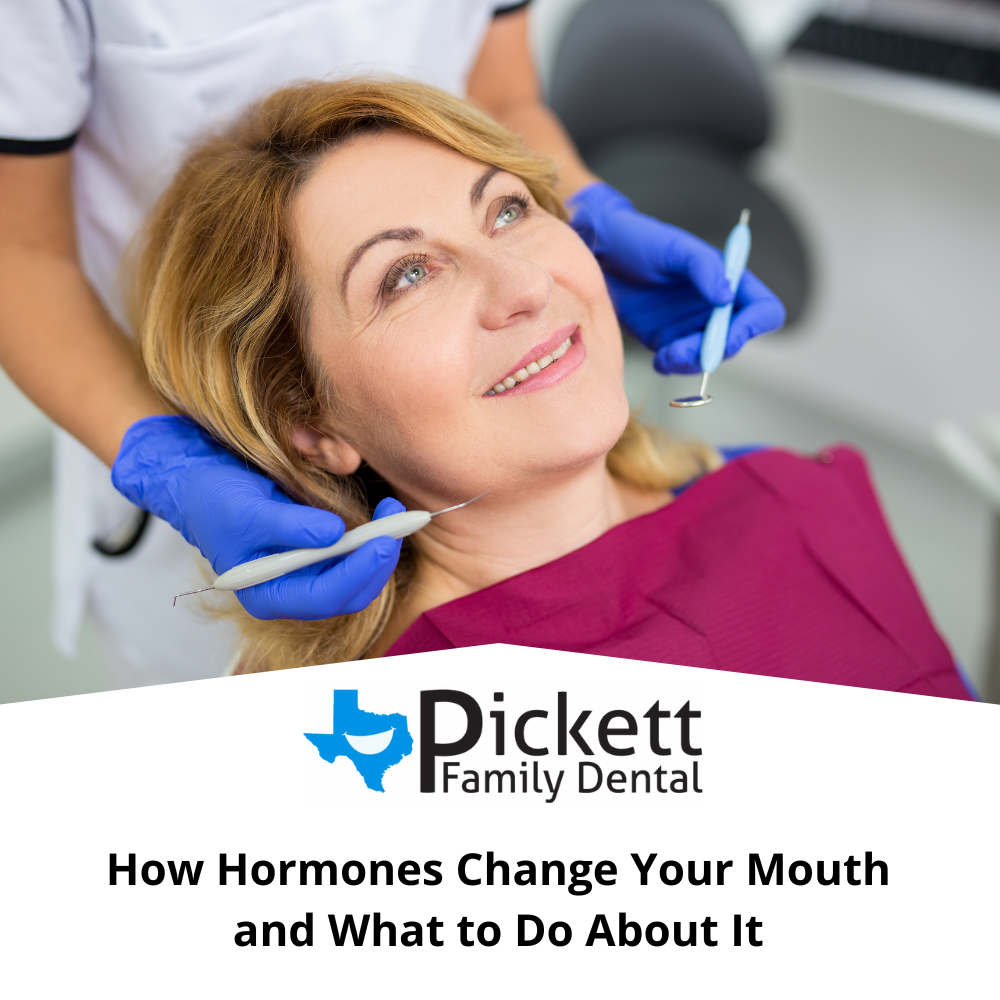We help patients in Keller, TX manage the effects of hormonal changes on their oral health with personalized care, preventive treatments, and guidance for every stage of life.
Your mouth is more connected to the rest of your body than you may realize, and your hormones play a big role in that connection. From puberty to pregnancy to menopause, changes in hormone levels can affect your teeth, gums, and overall oral health. Many patients are surprised to learn that issues like bleeding gums, dry mouth, or even bad breath can be directly linked to shifts in hormones. At Pickett Family Dental, we provide compassionate, effective care to help you protect your smile—no matter what stage of life you’re in.
Hormonal Changes That Affect the Mouth
Hormones like estrogen and progesterone influence the blood supply to your gums and affect how your body responds to plaque and bacteria. When these hormone levels rise and fall, your mouth often reacts in noticeable ways.
Puberty
During puberty, hormone surges can increase blood flow to the gums, making them red, swollen, and more likely to bleed when brushing or flossing. This condition, sometimes called “puberty gingivitis,” is common but manageable with good hygiene and regular dental checkups.

Menstrual Cycle
Some women notice gum sensitivity, swelling, or canker sores that appear right before their period. These short-term changes usually fade quickly but can be uncomfortable.
Pregnancy
Pregnancy is one of the most significant times for hormonal influence on oral health. Increased progesterone can lead to pregnancy gingivitis, with gums that are tender, swollen, and prone to bleeding. Some women also develop “pregnancy tumors,” which are non-cancerous overgrowths of gum tissue caused by irritation and excess hormones.
Menopause
During menopause, decreased estrogen can cause dry mouth, burning sensations, and increased risk of bone loss in the jaw, which may affect tooth stability. Gum recession and heightened sensitivity are also more common at this stage.
Common Symptoms Linked to Hormonal Shifts
Even if you maintain a solid brushing and flossing routine, hormonal changes may still cause noticeable symptoms, such as:
-
Red, swollen, or bleeding gums
-
Increased tooth sensitivity
-
Persistent dry mouth
-
Mouth sores or burning sensations
-
Bad breath that doesn’t go away with brushing
-
Loosening teeth in severe cases
These issues aren’t always signs of poor oral hygiene—they can be your body’s way of responding to internal changes. That’s why it’s important to tell your dentist about life stages or hormonal shifts you’re experiencing.
What You Can Do to Protect Your Oral Health
Hormonal changes may be unavoidable, but their effects can be managed with the right care. Here are some steps that help keep your smile strong and comfortable:
-
Maintain consistent oral hygiene. Brush twice daily with fluoride toothpaste and floss once a day to minimize plaque buildup.
-
Schedule regular dental checkups. Professional cleanings help prevent gingivitis from progressing, and your dentist can spot early warning signs of gum disease.
-
Stay hydrated. Drinking water helps combat dry mouth and keeps bacteria in check.
-
Use antimicrobial rinses. Mouthwashes recommended by your dentist can reduce inflammation and fight bacteria.
-
Adjust your diet. Eating calcium- and vitamin D-rich foods supports teeth and bone health, while limiting sugary snacks helps reduce plaque.
-
Consider saliva substitutes. If you’re struggling with dry mouth, your dentist may recommend over-the-counter products or specific treatments to improve comfort.
What Patients Want to Know About Hormones and Dental Health
Many patients ask if it’s safe to visit the dentist during pregnancy. The answer is yes—routine dental care is not only safe but encouraged. In fact, treating gum issues during pregnancy may reduce risks linked to preterm birth and low birth weight.
Others wonder if menopausal symptoms like dry mouth will go away on their own. While some changes may improve over time, dry mouth often requires targeted treatment to protect against decay and gum problems.
Another frequent question is whether crooked or shifting teeth in adulthood are linked to hormones. In some cases, yes—bone density changes during menopause can affect tooth stability and alignment. That’s why monitoring and preventive care are so important.
Get the Help You Need to Manage Hormonal Changes and Oral Health in Keller, TX
Get the help you need to protect your mouth during hormonal changes with expert care at Pickett Family Dental in Keller, TX. Whether you’re going through puberty, pregnancy, or menopause, our team understands the unique challenges these life stages bring to your oral health.
We provide preventive cleanings, personalized advice, and safe treatments that fit your needs at every stage. By working together, we can help you minimize discomfort, avoid long-term complications, and keep your smile healthy for life.
Schedule your appointment today and let us support your smile through every change your body brings.



